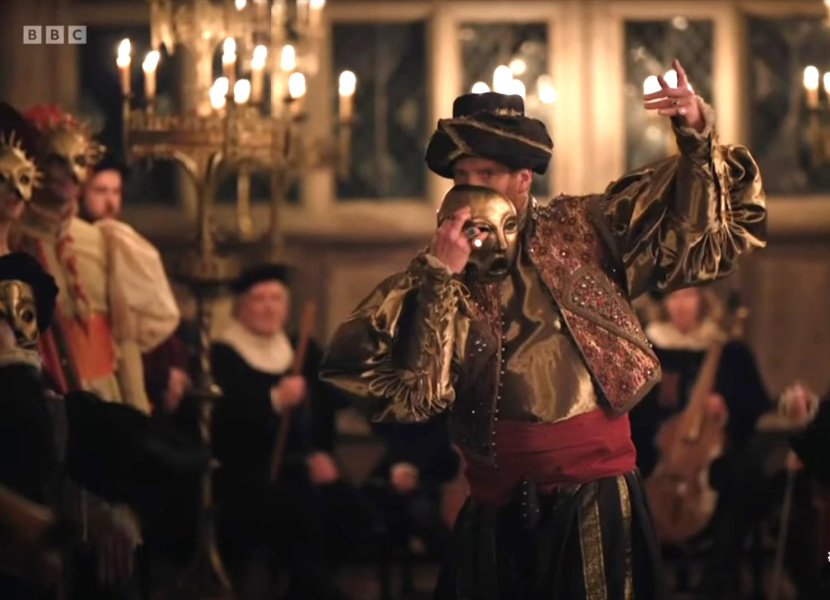– Prestige TV and Machiavellian Masterpiece –
by Jon O’Brien | Radio Times | November 10, 2024
Four out of Five Stars
The first season of Wolf Hall, which debuted in 2015, appeared to foreshadow all the political upheaval that’s occurred in the subsequent nine years: a monumental fallout with Europe, the unstoppable rise to power of a tyrant, the death of the Queen. Only time will tell whether its belated return, which takes place between 1536 and 1540, will be just as prescient.
But picking up immediately where things left off – the simultaneous public execution of poor Anne Boleyn and the third of Henry VIII’s six weddings – the Tudor drama is undoubtedly still as ominous.
The Mirror and the Light is the source material this time around, the final part of Hilary Mantel’s fictionalised trilogy exploring Thomas Cromwell’s remarkable journey from humble blacksmith’s son to Henry VIII’s chief minister – spoiler alert for those who didn’t pay attention in history class: it doesn’t end well for the principal protagonist.
“When fortune turns against you, you will feel the lash,” the ghostly vision of Cardinal Wolsey (Jonathan Pryce) remarks to his protégé in an early warning of the treachery ahead.
Once again, Mark Rylance proves why he’s regarded as one of Britain’s greatest living thespians, delivering a typically nuanced performance which captures the complexities of such a self-made schemer.
Initially, his Cromwell, now promoted to the role of Lord Privy Seal, barely gives anything away. Even when physically violent (“Get out while you still have your head,” he threatens one dissenter while manhandling him out of court), he manages to retain an air of composure, arguably making him more fearsome than Damian Lewis’s more overtly-monstrous, increasingly gout-ridden king.
However, Cromwell’s mask subtly begins to slip as he’s forced to question the monarch he’s proudly been beholden to (“I’m a good dog. If you set me to guard something, I’ll do it.”), firstly due to the threats towards the princess he possibly wishes to marry, and then the threats towards himself.
In other hands, it would be difficult to feel much sympathy for such a calculating presence, but Rylance, alongside scriptwriter Peter Straughan, digs deep to find the humanity within.
Of course, Rylance is far from the only actor at the top of his game. What Lewis lacks in physical resemblance he makes up for in mercurial swagger as a man with a psychopathic fickleness over his various ‘divorced, beheaded, died’ wives.
“Have I married a fool?” Henry asks just days after the nuptials to Jane Seymour (Kate Phillips, saddled with perhaps the most thinly-drawn wife), before declaring, “I have come out of hell into heaven.”
Elsewhere, Lilit Lesser provides some much-needed girl power as Mary, the devout Catholic princess who essentially declares “Not my king” about her own father. Thomas Brodie-Sangster – who somehow doesn’t seem to have aged a day during the near-decade-long gap – impresses as one of the few characters with a moral conscience (“Did it have to be this way, so bloody?” his Privy Councillor Rafe Sadler asks Cromwell, not unreasonably, having just watched Anne’s head decapitated by a balletic Frenchman).
And replacing the late Bernard Hill, Timothy Spall steals every scene as the blustering Duke of Norfolk (“He speaks to a woman as if she was a town wall and he has to breach her,” notes Cromwell just moments after the cretin has crudely compared a destroyed tapestry to toilet paper).
It’s the kind of comedic turn you’d expect from The Great, Mary and George or any number of other streaming-age hits that have gleefully subverted the regal period drama since Mantel’s work was last adapted for the screen.
Apart from some colourblind casting, which has got the anti-woke brigade up in arms (Egyptian-born Amir El-Masry has taken over from Scotsman Jack Lowden as Thomas Wyatt, while Sarah Priddy, an actress of British-African heritage, portrays Lady Margery Seymour), this is where the similarities end.
Indeed, those who’ve enjoyed Nicholas Hoult huzzah-ing it up as Emperor Peter III may find the rest of Wolf Hall a little austere in comparison: the pace can often be glacial; the sets, while meticulously attentive to period detail, are often shrouded in candlelight; and the complex machinations of the plot sometimes requires a CliffsNotes to fully comprehend. This is prestige TV with a capital P that’s meant to be slowly digested, not binged, justifying the BBC’s decision to premiere a new episode every Sunday evening rather than immediately offload all six on iPlayer.
The Mirror and the Light is therefore easier to admire than love. But like its predecessor, which was showered with accolades including eight Emmy nods, a BAFTA and Golden Globe, it will no doubt go down in the history books as a Machiavellian masterpiece.
Read the rest of the original article at Radio Times
